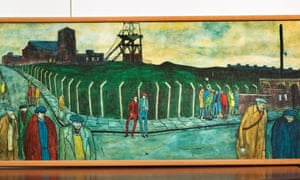Frances O’Grady on the TUC at 150: ‘Unions have to change or die’
The Guardian
As the organisation tries to reach younger people, its leader sees sparks of a mass movement

Above Frances O’Grady’s desk hangs a striking image of miners pouring out of Murton colliery, in County Durham, by the pitman painter Tom McGuiness. Workers stream out into the early evening light, a group gather to chat, and in the far corner a woman in a bright yellow coat is caught in an embrace.
“I love it, I just love it,” says O’Grady of the restored painting, which was found in the basement of the TUC’s headquarters, Congress House in London. “I never had that romantic view of mining. [But] this picture shows there was a kind of nobility about it.
“But what was that nobility about? It was about solidarity between people. It wasn’t what they actually did, it was something about that sense of community. I think we need to have a very basic discussion about the value of labour and [ask] how did we end up forgetting it – and how do we rediscover it.”
This week marks 150 years since the first Trades Union Congress gathered in the Manchester Mechanics’ Institute. O’Grady, who became the TUC’s first female leader in 2013, finds herself at the helm in an era of zero-hour contracts and ever more complex, atomised supply chains. Union membership, particularly among young people, is falling.

The TUC is using the anniversary to overhaul the way it recruits younger members, launching a pilot for a new app to offer young people advice about their rights and how to get ahead in work. It will also quietly try to bring them into trade unionism, with the idea of offering users the chance to connect with other similar workers across industries.
“If we’ve got a digital economy we’ve got to have digital trade unionism,” says O’Grady. “And if we have young people whose bosses will do everything they can to avoid recognising a union, we don’t walk away, we reinvent ourselves, we do something new. If you can’t get through the front door, you go around the back. I want that spirit that we are a ‘have-a-go’ movement.”
The new online factory gate, developed over the last two years with the 50 unions that fall under its umbrella, will use the power of online networks instead of penny newspapers to connect workers, she says.
“Wouldn’t it be wonderful if we could say: would you like to talk to other baristas, or people working in this company? This is the great efficiency of cooperation and organising: we can begin to bring people together online and offline to get a better deal for people at work.”
Instead of paying subs to a union in the normal way, the WorkSmart app will use the “freemium” model used by music streaming services such as Spotify, with workers encouraged to pay for some added services while also being nudged into union membership.
With a report on Monday suggesting the generational pay gap between over- and under-30s has more than doubled in the last 20 years, and millennials increasingly being priced out of the housing market and struggling to find secure work, O’Grady says there needs to be a “civil rights movement for young people”.
Unions find themselves in an unenviable position, arguably increasingly necessary for younger workers, who nonetheless join their ranks in fewer and fewer numbers. Last year saw the biggest trade union membership dropsince records began.
O’Grady stresses that the TUC is still nearly 6 million strong, and it remains the largest democratic membership organisation in the UK, but she recognises that the threat is real. “Conventional trade unionism still works very effectively in some areas but what’s clear is that business models have radically changed,” she says. “Unions have to change too – change or die.”
Despite the falling numbers, she is doggedly optimistic and points to recent strikes at McDonalds, TGI Fridays, Picturehouse cinemas and Sports Direct as the “sparks” of a new mass movement. “It is within our grasp because certainly some of the conditions that gave rise to the [first wave of mass unionism] are echoed in conditions we see today,” she says.
“We tell ourselves that these young people are on insecure contracts and if they put their head above the parapet they’ll be sacked, but some of them have that sense that they have nothing to lose. And they have more courage than perhaps they have been given credit for.”

Almost a year after the publication of the Taylor review, which proposed new protections for workers in the gig economy, O’Grady is angry at the lack of action from the government, despite promises from the prime minister. “I don’t know what has happened to Theresa May tackling burning injusticesbecause at the moment it feels like petrol is being poured on the flames of them,” she says.
With the Brexit deadline drawing closer these are precarious times for Britain’s workers, she adds. The TUC, which supports staying in the customs union and single market as “the least worst option”, worries about the erosion of hard-won worker rights enshrined in EU law.
“That floor of rights wasn’t something that was given to us, it was something we fought for across borders to get pushed through the system of social partnership in the EU,” she says. “If we lose that level playing field of rights how long before Boris Johnson and Michael Gove start chipping away at the rights that we have, never mind keeping pace with improvements in Europe?”
So while the TUC’s 150th anniversary could be a moment for some wistful glances in the rear-view mirror, O’Grady insists it has to be used to propel the movement into the future.
“This isn’t a trip down memory lane,” she insists. “It’s drawing on that history of constant innovation and daring and that’s what I want us to do – to take a few risks. We won’t succeed on every front but if we don’t try, as they say, we will surely fail. So we are going to try.”
